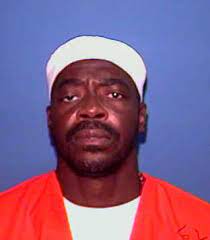Clarence Hill was executed by the State of Florida for the murder of Officer Stephen Taylor
According to court documents Clarence Hill and Cliff Jackson would rob a bank setting off the alarm. Pensacola Police Officer Stephen Taylor was first to the scene and was arresting Cliff Jackson when Hill walked up behind the Officer and began shooting. Taylor would die in the shooting
Clarence Hill would be arrested, convicted and sentenced to death
Clarence Hill would be executed by lethal injection on September 20 2006
Clarence Hill Photos

Clarence Hill FAQ
When Was Clarence Hill Executed
Clarence Hill was executed on September 20 2006
Clarence Hill Case
Clarence E. Hill, convicted of killing a Pensacola cop during a botched bank robbery in 1982, was executed by lethal injection on Wednesday evening at Florida State Prison. Hill had been strapped to the death gurney once before, in January, and was moments away from execution then when the U.S. Supreme Court granted him a stay of execution so he could challenge Florida’s method of lethal injection on the grounds it violated his civil rights. That was unsuccessful, there was no reprieve on Wednesday evening and a combination of three powerful drugs took his life at 6:12 p.m. Hill had no last words.
The execution marked the end of a crime that began in 1982 when police say Hill shot two police officers after he and an accomplice held up a savings and loan in Pensacola. Officer Stephen Taylor, 26, was one of the first on the scene when the two robbers came out of different doors of the bank, said Pensacola police Assistant Chief John Mathis. Taylor and Officer Larry Bailly were attempting to handcuff suspect Cliff Jackson when Hill came up and began shooting, according to court records. Hill shot Taylor in the side, Mathis said. Hill also wounded Bailly. Both Hill and Jackson were also hit during the exchange of gunfire. Jackson is serving a life sentence. Taylor’s portrait hangs in the lobby of the Pensacola police station, Mathis said, a ”vivid reminder” of what can happen in police work.
Hill’s execution came within days of a lengthy American Bar Association study that says Florida complies with only eight of 93 ABA legal standards covering death penalty cases. Florida also leads the country in exonerations of prisoners on Death Row, with 22 since 1973. The ABA made 11 recommendations for change in Florida, including a requirement that Florida juries unanimously recommend the death sentence as they do in the 37 other death-penalty states. Today, jurors need only recommend death by a majority vote, and judges have the final say. Though it apparently hasn’t happened since 1999, the report says, a judge has the authority to override a jury’s recommendation of life in prison and sentence the convicted person to death.
Hill’s execution was the 61st since Florida resumed executions in 1979. The U.S. Supreme Court struck down the death penalty as unconstitutional in 1974. Florida and other states revised their laws, and in 1976 the court reversed its ban.
In January, Hill’s attorney, Todd Doss, won a stay of execution and later a unanimous decision from the Supreme Court, sending the case back to Florida on a narrow legal point. Hill had a right, the justices said, to file a claim in federal court that the state’s method of lethal injection violated his civil rights against cruel and unusual punishment. The argument was not whether Hill would be executed. That had been settled.
Doss argued that if the first drug, a powerful anesthetic called sodium pentothal, didn’t do its job properly, then when the heart-stopping third drug, potassium chloride, was administered, Hill could feel intense burning in his veins. But because the second drug in the series, pancuronium bromide, had paralyzed his muscles, there would be no way to tell he was in pain, Doss argued. State lawyers have countered that the initial anesthetic is a very high dose, is effective and does not wear off before the other drugs are administered. The Florida Supreme Court has upheld the Department of Correction’s method of lethal injection, and the U.S. Supreme Court has not overturned any cases on the issue, said Carolyn Snurkowski, an assistant attorney general who handles death penalty appeals. After the Supreme Court cleared the way for Hill to challenge Florida’s procedure, his claim was rejected by a federal judge in Gainesville. The 11th Circuit Court of Appeal in Atlanta upheld the lower court ruling.
With Hill’s execution, there are 376 men and no women left on Florida’s Death Row. They are housed in two prisons, Florida State Prison, west of Starke, and nearby Union Correctional Institution









